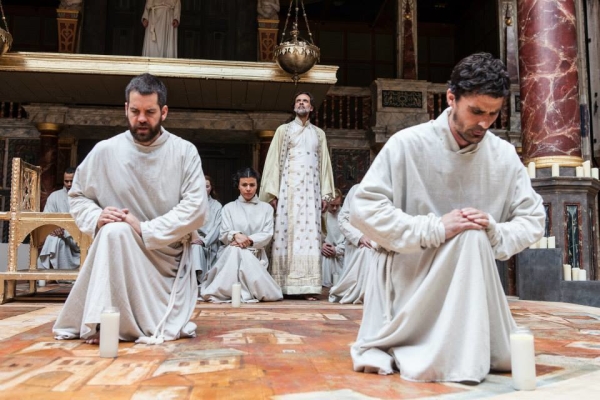Holy Warriors (Shakespeare's Globe)
David Eldridge’s epic new play looks at the history of religious conflict in the middle east

© Marc Brenner
Still, it revels in the conditions of the Globe and sets out the story of the clash between Saladin and Richard the Lionheart – happy memories, perhaps, of "Those Saladin Days" from Tim Rice and Stephen Oliver's Blondel? – with the fate of Jerusalem fast forwarded through to Ben Gurion, Golda Meir, President Bush and a hilariously casuistic Tony Blair.
The crusade is then re-cast, like a reflective wash, over the modern era, with Saladin (Alexander Siddig) dressed as a modern Arab general and Lionheart (the mellifluously baritone-voiced John Hopkins) as a brutal invading American general in beret and battle fatigues.
"The writing is deft enough… to avoid the whole thing sounding like a quick historical guide, let alone a polemic"
The question Eldridge and his director James Dacre pose is: why were the Europeans in the Middle East in the first place, and why are they now (with the Americans)? And the writing is deft enough, the direction witty enough, to avoid the whole thing sounding like a quick historical guide, let alone a polemic.
The English/French relations behind the crusade provide some rich dramatic pickings, with Lionheart squaring up to a milksop Philip of France (Jolyon Coy bounces this role back beautifully as Lawrence of Arabia later on) and his future regent Eleanor of Aquitaine; Geraldine Alexander makes of this great woman – worthy of several plays on her own – a fierce opponent and a revenant of revenge.
The Globe stage is repainted in Mike Britton's design as a pictorial medieval map of Jerusalem, a huge golden crucifix upturned to reveal a blood red underside as the city is taken for the Muslims, the auditorium subsumed in fluttering pink petals (the Globe must surely soon run out of these pesky petal showers) and soldiers in their traps visited by Lionheart on an "eve of Agincourt"-style undercover gee-up.
After the interval, the timeline is collapsed to include the sovereign state of Israel, the Camp David peace agreement, the 9/11 attacks, even the recent kidnapping and burning alive of boys on either side of the Palestinian divide.
With the chanting of world leaders, we even enter the more disputed territory of a John Adams opera (music by Elena Langer) and of course by the end the holy war has become a war on terrorism as Middle Eastern conflict is high-jacked once again as a means of justifying the civilised values of Christianity and capitalism in the West.
Some of the arguments later on are mashed and garbled, but there's nothing wrong with an epic overview and no harm (or much prejudice) in recounting the events as a historical sideshow that undoubtedly contains a fundamental truth in matters of power, politics and sins on all sides committed in the name of religion and righteousness.












